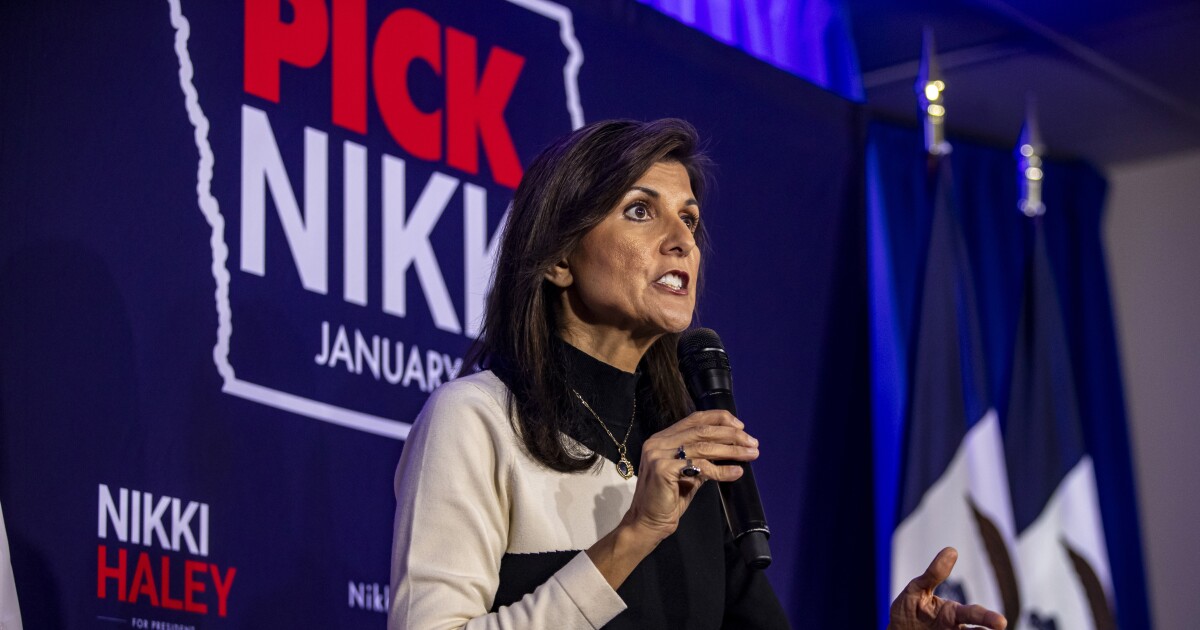

Former United Nations Ambassador Nikki Haley has a path to the 2024 Republican presidential nomination similar to that of the late Sen. John McCain.
Haley may have stepped into a controversy similar to one that bedeviled McCain in both his GOP presidential primary bids.
DESANTIS CAMPAIGN ON THE BRINK AS IOWA CAUCUSES NEAR
While Haley was campaigning in New Hampshire on Wednesday, a voter asked her what caused the Civil War.
“I mean, I think the cause of the Civil War was basically how government was going to run. The freedoms and what people couldn’t do,” Haley replied.
Pressed by the voter on why she did not mention slavery, Haley shot back, “What do you want me to say about slavery?”
The questioner appeared hostile. So was the instant Democratic response, seeking to undercut Haley as a mainstream alternative to other GOP candidates.
“Nikki Haley’s comments tonight were a slap in the face to Black voters, who she has turned her back on time and again — from championing the Confederate flag to trivializing Black History Month — and they’ll turn their backs on her at the polls,” Democratic National Committee Chairman Jaime Harrison said in a statement Wednesday night.
Haley is hoping to upset former President Donald Trump in New Hampshire, setting herself up for a battle in her home state of South Carolina in February. She is also gaining on Gov. Ron DeSantis (R-FL) in next month’s Iowa caucuses.
McCain largely bypassed the 2000 Iowa caucuses but beat George W. Bush in New Hampshire and hoped to defeat him again in South Carolina. That’s when he got himself into trouble on the subject of the Confederate flag, then still flying atop South Carolina’s statehouse.
McCain, who called the flag a “symbol of racism and slavery” in early 2000, quickly amended his statement to call it a “symbol of heritage.” Ahead of the South Carolina primary, the Arizona Republican said the state’s voters should decide its status at the statehouse.
In April 2000, after losing the February South Carolina primary to Bush and a crippling blow to his campaign to win the nomination, McCain recanted.
”I feared that if I answered honestly, I could not win the South Carolina primary,” McCain said as he apologized. ”So I chose to compromise my principles. I broke my promise to always tell the truth.”
McCain added that his Confederate forefathers had “fought on the wrong side of American history” during the Civil War. ”I don’t believe their service, however distinguished, needs to be commemorated in a way that offends, that deeply hurts, people whose ancestors were once denied their freedom by my ancestors,” he said.
The issue resurfaced when McCain ran for the Republican nomination again in 2008. By that time, the flag had moved from the statehouse dome to elsewhere on the capitol grounds. But McCain’s path to the general election — largely ignore Iowa, win New Hampshire, then win again in South Carolina — was much the same.
“Probably the worst piece of advice I’ve ever given to myself was when the Confederate flag was flying over the state capitol in South Carolina,” McCain said in an interview with Katie Couric during that cycle. “And I decided that I would say it’s not an issue I should be involved in, that it should be decided by the people of the state of South Carolina. I knew it was a symbol that was offensive to so many people. And afterwards, I went back and apologized. But it was needless to say, by saying that I wouldn’t have anything to do with an issue like that was an act of cowardice.”
McCain went on to win the South Carolina primary that year and then the GOP presidential nomination. He lost the 2008 election to Barack Obama.
The Confederate flag was removed from its place of prominence on the South Carolina capitol grounds in 2015. The governor who signed the bill mandating this into law was Nikki Haley.
When Haley announced her campaign for the 2024 Republican presidential nomination, few Republicans thought her Confederate flag decision would be a political liability.
The former South Carolina governor and Trump ambassador also argued her background as a child of Indian immigrants was a refutation of “woke” critiques of both the GOP and United States history.
But Haley, who was elected South Carolina’s first nonwhite governor, had to navigate these issues while coming up in the Palmetto State.
Democrats and some online supporters of other Republican presidential candidates were quick to criticize Haley’s Civil War response.
CLICK HERE TO READ MORE FROM THE WASHINGTON EXAMINER
“I am disgusted but I’m not surprised — this is what Black South Carolinians have come to expect from Nikki Haley, and now the rest of the country is getting to see her for who she is,” Harrison said in his statement. “This isn’t hard: condemning slavery is the baseline for anyone who wants to be president of the United States, but Nikki Haley and the rest of the MAGA GOP are choking on their words trying to rewrite history.”
Whether Haley will have a McCain-like change of heart before voting starts remains to be seen.





